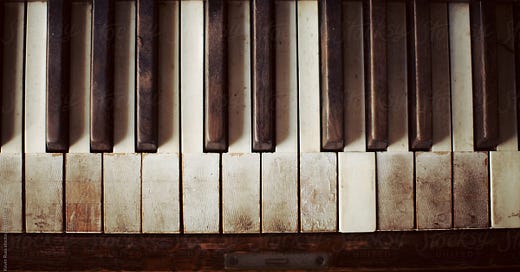My uncle, who suffered from early-onset Alzheimer's, died this morning. I remember him from my childhood as the guy who sang and played guitar at holidays and birthday parties. He was fun to be around, the kind of adult kids trust, because they can see he is playful.
The memories are fuzzy for me, but I remember he started to have problems with his cognition when I was twelve or thirteen (he was in his sixties). He was supposed to meet our family at a cottage one day. Hours went by, and nobody knew where he was. My dad went out to search the town nearby, and found him wandering, not sure of his location or where he was going. Things deteriorated quickly after that.
He went to live in a nursing home that took a lot of people with Alzheimer’s. It was probably nice for those kinds of places, but still terrifying. Its center was a large, crowded common room in which every few minutes somebody would forget (or realize) where they were and start to panic. A small team of nurses worked to make sure all the residents were as comfortable and entertained as possible.
In my first year of university, I got a job there as a piano player. I would go in and play for about half an hour, and then spend time with my uncle. I played a mix of oldies, Jewish music, and 60s pop, which got the residents singing, and sometimes even dancing. Afterwards, I would approach my uncle, who had completely forgotten who I was, and offer to teach him a piano lesson. Some days he would accept, and I’d try and teach him some scales and chords. Other days he wouldn’t be interested, and we would walk, talk, or I would read to him instead. He was amazed at my ability to read, and repeatedly asked me “how do you do that?”
One day, when I walked in, he recognized me for the first time in many years. “You’re the piano guy,” he said. “Are you going to play today?” I guess I had shown up to play piano enough times that, athough he couldn’t remember me as his relative, he was able to remember me as the piano guy. Several times I had explained to him that we were related, but it hadn’t stuck. “The piano guy” stuck, and I found when I came after that, he was better able to recognize me.
Towards the latter half of my time working at the home, my uncle became quite agitated. He had come to believe that he had to find his mother because she didn’t know where he was (his mom had died many years ago). I had the grim duty of explaining to him, over and over and over again, that his mom was dead. Every time, his response was one of bewilderment. “Wowww. Ok. Really?” I thought he would have been more upset, but he was just confused about why he was so confused.
Due to this false belief, he repeatedly tried to escape from the home in order to see his mother, who he believed was worried about him. The staff there would try to stop him, and he would get very angry with them. He eventually had to be moved to a hospital, and then to a more serious care facility.
I was supposed to have visited him for the first time in a long time two weeks ago, but I ended up getting really sick and had to cancel. I wish I hadn’t gotten sick and that I could have seen him one more time. I heard that despite some bad health problems, he had managed to live the last few years of his life as well as anyone can in his condition.
It’s easy to take your mind for granted, but you really can lose your mind, forget everyone you know, and wake up every day trying to escape where you are, because you think you’re supposed to be somewhere else. It’s frightening to watch someone go through that, and I imagine it’s far more frightening to go through it yourself. And yet, it’s possible to go through all that, and I’m sure much more, and still be more joyful than not, like my uncle did. Mental illnesses and brain disorders can destroy our identities, our memories, our capabilities, but they cannot destroy our capacity to love and to be loved.





Beautiful story.
Did you ever consider not telling him that his mother was dead? Say she went on a trip or something? That’s what I think I would’ve done.
Thanks for writing this Jonah. It’s a lovely reflection.